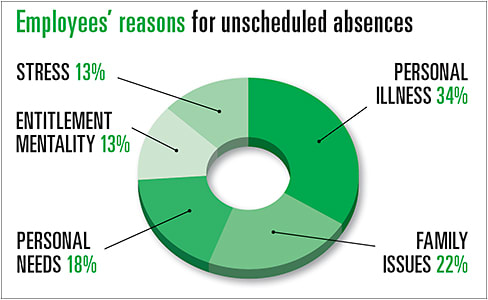BUSINESS
PERSONNEL POINTERS
COMBAT ABSENTEEISM
OUTLINE EXPECTATIONS AND CONSEQUENCES IN AN EMPLOYEE GUIDE
TRUDI CHAREST, R.O.
DO YOU have an employee who continually arrives late for work? Another employee who is sick every month? You’re not alone. Almost every optometry office has run into these issues. It can have a negative effect on your overall revenue; it also can affect team morale. Leaving these issues unaddressed can cause further complications, such as staff turnover and patient dissatisfaction.
There are ways to control abuse of absenteeism and tardiness by setting expectations and an office policy specific to these circumstances. Here’s how to get started:

Source: CCH survey
CREATE A POLICY
Every business should have an employee policy handbook. It will protect you legally and prevent headaches when staff push policy boundaries. When the policy is in writing, and all staff members have signed off, it is easier to enforce. It is also a good idea to consult labor laws; the Department of Labor is a good resource for this.
Example absenteeism and tardiness policy: Your attendance at work every day is crucial in making our practice run smoothly and efficiently. Our expectations are that you will do everything in your power to ensure a good attendance record.
We understand that some circumstances are beyond your control and may require you to be late or miss scheduled work time. We have put the following policy in place for you to utilize:
Absence: Each employee can receive up to five sick or personal days in one calendar year. For new employees, this is prorated during the first year and only effective after a 90-day probation period. In the event you are unable to work, the required procedure is to call or text your immediate supervisor as far in advance as possible.
All missed work will be tracked. Examples include sick time, medical appointments, child care, etc. Time off must be scheduled — if it’s not a sick day — approved by a supervisor and taken in full or half-day segments only. Once this time has elapsed, a meeting with your supervisor will be scheduled to discuss future absence.
Punctuality: Each employee is expected to be in the office and at his or her work station a minimum of five minutes before a work shift commences. When an employee is late more than three times in a calendar year, he or she will have a performance meeting with his or her supervisor. While we understand that weather and traffic can play a role in punctuality, it is the employee’s responsibility to leave early enough to avoid these situations.
HEALTH CARE SUPPORT WORKERS MISSED 2.6% OF WORK HOURS DUE TO ABSENCES, COMPARED WITH 1.5% FOR ALL WORKERS.
Source: U.S. Bureau of Labor Statistics for full-time workers in 2015
TRACK ABSENCE AND TARDINESS
Now that you have a set policy, don’t let it slide. Have your receptionist or your office manager track all absences and late arrivals. Once absenteeism is clearly documented as a problem, schedule a meeting with that employee.
HANDLE EXCESSIVENESS
As a business owner you know you and your staff are affected each time someone misses work or shows up late. When an employee has surpassed the allotted time available, take suitable action.
First, determine why he or she is missing work. Is it an illness or injury? Personal problems? Is it something you can help him or her to sort through? (Be careful once you do determine the cause, so that you act within federal or state laws. If you are at all unsure, contact a licensed human resources professional.)
If you have determined you need to take steps to combat the problem, schedule a meeting with the employee, have another partner or office manager with you. In a disciplinary letter, document the exact dates and times in question, actions expected moving forward and consequences, should the behavior continue.
A FEW BAD APPLES
Most employees are not a problem. These issues generally affect one or two people. Don’t let their actions slide and affect the rest of the team. In fact, reward the rest of the team for perfect attendance or pay them for sick time not used. That will send a clear message that attendance is important and, therefore, rewarded. OM

| MS. CHAREST is the Co-Founder of 4ECPs, a practice management resource company for eyecare professionals. 4ECPs has three divisions, including Eyecare Jobs, Marketing & Training. Visit www.4ecps.com or email trudi@4ecps.com. |



